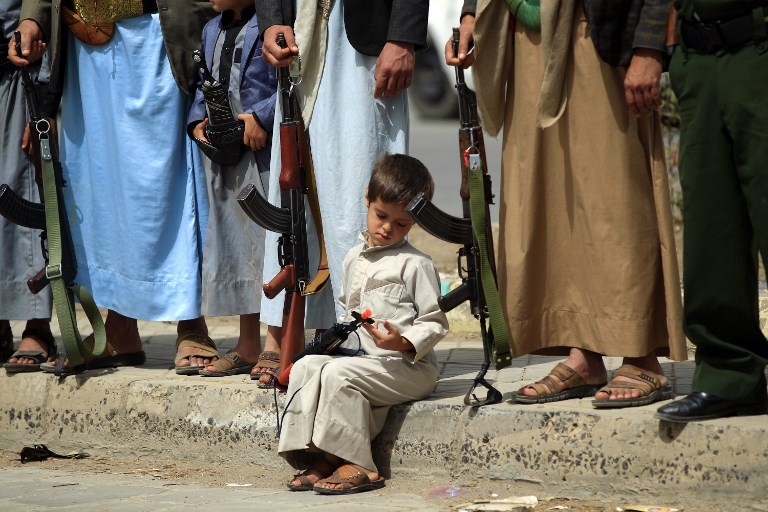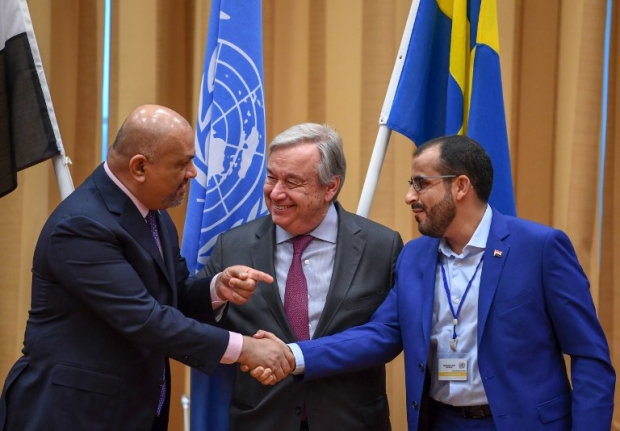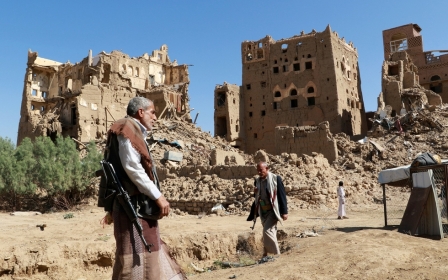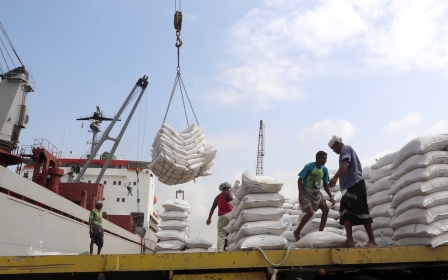Yemenis greet Sweden peace talks with doubt and some small hope

SANAA - After nearly four years of war, many Yemenis have greeted the outcome of peace talks held in Sweden this week with tempered optimism, and some with outright scepticism.
On Thursday, after a week of negotiations, UN Secretary-General Antonio Guterres announced that the warring sides had agreed to a province-wide ceasefire in Hodeidah and the withdrawal of troops from the contested Red Sea port city.
I am not stupid enough to believe the lie of peace talks. Yemenis have been negotiating since 2011, but no single agreement was implemented
- Magdi al-Qubati, accountant
They have also agreed on a prisoner swap and to establish a humanitarian corridor in the province of Taiz, while the issue of Taiz city, besieged since April 2015, remains unresolved.
The talks were the fourth to be held since the Saudi-led coalition began bombing Yemen in 2015. Since then, more than 60,000 Yemenis have been killed in fighting, and up to 85,000 children under five may have died from starvation or disease, according to Save the Children.
Previous agreements from these negotiations have been quickly violated and have failed to be implemented, and many Yemenis expressed doubts that those made in Sweden will be any different.
Magdi al-Qubati, who works as an accountant in Sanaa, told Middle East Eye: "I am not stupid enough to believe the lie of peace talks. Yemenis have been negotiating since 2011, but no single agreement was implemented.”
Qubati, who is originally from Taiz city, has not been able to visit his family since 2015 because the warring parties closed the main roads.
Qubati said he hoped the talks would be implemented on the ground so he can see his relatives and friends once again, but he’s not holding his breath.
"I lost the hope after more than several local and international agreements to open the road,” he said. “This is the case with most Yemenis.”
'Scepticism is warranted'
Many Yemeni observers, humanitarian workers and participants in previous talks shared Qubati’s doubts on social media soon after Gutteres’s announcement from Rimbo, outside Stockholm.
Ali al-Bukhaiti was a member of the Houthi delegation in the National Dialogue Conference, a two-year process following the fall of President Ali Abdullah Saleh that failed to resolve differences among various Yemeni parties and factions and ended in early 2014.
In 2015, when the Houthis took control of Sanaa, Bukhaiti abandoned the group and travelled to Jordan, where he now runs a website called The Republican Yemen.
On Thursday, in a series of tweets, he said that the talks would only serve the purposes of the UN envoy, ambassadors and international organisations, and would not bring peace on the ground.
“Nothing from the agreement of peace talks in Sweden will be implemented and only the souvenir photos will remain after these talks,” he said.
"They [negotiators] will announce the success of the peace talks in a festive celebration and the agreements of talks will be withdrawn after the end of the talks. The Houthis will add conditions under the pretext of the explanation of some clauses.”
Rasha Jarhum, a Yemeni activist and director of Peace Track Initiative, an NGO pushing for the involvement of women, youth and civil society in peace processes,was more optimistic and tweeted:
Fatima Alasrar, a senior analyst at Arabia Foundation, a Washington, DC-based think tank, tweeted that there was “optimism, scepticism and pessimism” about the talks.
"Scepticism is warranted as it keeps the pressure on all parties to abide and deliver concrete outcomes towards peace,” she wrote. “Next few weeks will be a litmus test to whether there is willingness for peace."
Rashad al-Sharabi, a journalist for outlets linked to Yemen’s Muslim Brotherhood-connected Islah Party, said on Facebook: "There is no achievement from the peace talks. Those who speak about achievement and they are surprised, seem to be unaware of what happened during the last five years and how the Houthis did not adhere to any agreement, including those which were under the supervision of the UN. Days will prove my words."
'Next few weeks will be a litmus test to whether there is willingness for peace'
- Fatima Alasrar, Arabia Foundation
Abdikadir Mohamud, Yemen director for the US–based humanitarian organisation Mercy Corps, said in a statement that the measure of the agreement will be seen in the action on the ground, not the words in a conference room.
"While we are hopeful that the ceasefire agreement regarding the Hodeidah port will benefit the Yemeni people, this is just a first step,” Mohamud said.
“We need lifesaving supplies to reach the millions of people in need, and we need safe passage for the humanitarians who will distribute them.
"All parties to the conflict and their international supporters must immediately cease the fighting, reopen all of Yemen’s ports, facilitate humanitarian response, and take measures to stabilize the Yemeni economy."
The hope you have
But for other Yemenis, like Rislan Morie, the peace talks are the only shred of hope they have.
After the fighting began in Hodeidah in June, Morie, his wife and five children left the port city for Sanaa. Since June 2018, they have been living in a tent, near Ibn Sina Hospital.
Morie, who once worked as a farmer, said he has lost his job, his furniture, and his peace of mind. He refuses to lose his hope.
"We live with a glimmer of hope that battles will stop and we will return to our houses. Really, I do not want to lose this hope,” Morie told MEE. "If I lost hope, I may kill myself as life has become very difficult and we cannot live anymore under plastic sheets and tires amid this cold weather.”
Morie, who doesn’t read or write, wasn’t aware of previous peace talks and believed Sweden was the first time the two sides had met. He said his knowledge of the war consisted of what he saw locally, which is true for many displaced Yemenis.
Morie said he and his family had been told that the fighting would stop in Hodeidah in two weeks and they would be able to return.
"I appeal to the warring sides to stop the war for the sake of children and women,” he said. “If they visit us in our tents, I am sure they will feel sympathy and immediately will stop the war.”
Ashraf Yahya, another displaced man from Hodeidah now living in Sanaa, said he was also optimistic about the peace talks. This time, he said, feels different.
"We used to hear about quarrels, disputes and many disagreements between warring parties, but this time we watched the heads of the two delegates shaking their hands in Sweden under the presence of the UN representatives,” Yahya said.
"I think the warring sides are more convinced on a peaceful solution nowadays, more than any time before as they have had bad experiences in the war during the last four years.”
New MEE newsletter: Jerusalem Dispatch
Sign up to get the latest insights and analysis on Israel-Palestine, alongside Turkey Unpacked and other MEE newsletters
Middle East Eye delivers independent and unrivalled coverage and analysis of the Middle East, North Africa and beyond. To learn more about republishing this content and the associated fees, please fill out this form. More about MEE can be found here.





